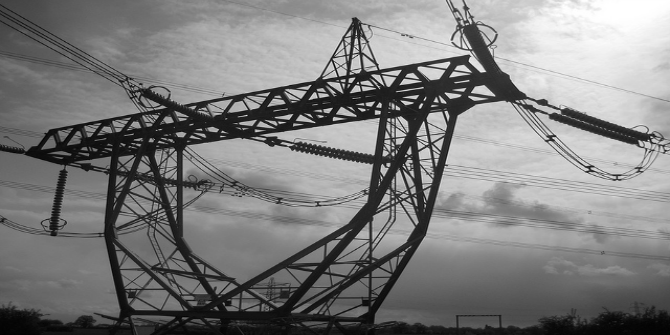 In our final year in review post, Steve Fuller looks back on 2012. He explains how there are two stories from the end of this year which he will be watching intently in the next.
In our final year in review post, Steve Fuller looks back on 2012. He explains how there are two stories from the end of this year which he will be watching intently in the next.
The implications of two stories from the end of 2012 are worth watching in 2013. The first story has global consequences. It concerns the terms on which a global climate agreement was reached in Doha in early December. Instead of pledging an across-the-board reduction of carbon emissions, the world’s nations concurred on the need to create a fund to assist the impoverished areas of the world in adapting to the substantial climate changes that most scientists forecast in the not-too-distant future.
This surprisingly – and, to my mind, welcomed – dose of pragmatism occurred in the same week that the UK Chancellor George Osborne announced substantial financial incentives for ‘fracking’, the deep-rock drilling for gas and petroleum, a process that the CEO of Shell Oil recently predicted on the BBC programme ‘Hardtalk’ would lead to a rejuvenation of the manufacturing sector in the developed world, not least the US and UK.
If successful, fracking could well delay the development of alternative energy sources, as well as threaten still greater destabilisation of the climate, as elements closer to the Earth’s core come to be disturbed. However, given the promised quantities of energy, fracking, even with all its risks, may also be the easiest way to uphold a ‘business as usual’ attitude towards organizing the world’s economy. Perhaps this is part of the Realpolitik behind Doha’s sudden burst of charity towards the people most vulnerable to severe climate change: Call it ‘anticipatory compensation’ for damages.
The second story has arguably more local, but no less important consequences – at least for the politics of the academy. It concerns the gradual unfolding of the world- view of David ‘Two Brains’ Willetts, government minister for universities, which is nowadays subsumed under the Department of Business. In mid-October, Willetts delivered almost two speeches – the second he simply published to avoid protests – that hinted at an intellectually sophisticated justification of the neo-liberal approach to academic research. However, ‘intellectually sophisticated’ does not necessarily mean intellectually satisfying!
The first speech was delivered at the annual meeting of the Association of Business Schools, located this year at my own University of Warwick, the original ‘enterprise university’. Here Willetts offered some bracing advice to UK business schools, which have been hit harder than most other parts of academia during the current recession. Income from both research grants and training programmes is sharply down in most places. In response, Willetts argued that business schools should be allowed to keep
a larger share of whatever income they receive – as opposed to using it to cross-subsidise less lucrative reaches of the university.
At the same time, and somewhat surprisingly, he stressed that business academics should be rewarded mainly for their contributions to improving the UK economy. The overall picture here is one of business schools becoming increasingly autonomous from their academic moorings, while aligning their research interests with that of government business policy. The proposal recalls Nationalökonomie and Staatswissenschaft – the customisation of economics and political science to the interests of the state – that was a distinctive feature of German academia during that nation’s rise to superpower status in the Wilhelmine period leading up to the First World War. It was against this backdrop that Max Weber struggled to assert social science’s ‘value-neutrality’.
Willett’s second speech was the annual John Desmond Bernal Lecture that was due to be delivered at Birkbeck College London. Armed with the strange political economy bedfellows of Friedrich Hayek and Karl Polanyi, Willetts chastised Bernal, an inveterate central planner with Soviet sympathies, for failing to see the role of a robust state in providing financial incentives and, more importantly, a secure legal infrastructure for innovative markets to develop.
Between these two speeches Willetts usefully demonstrates that the state in neo- liberalism is no less interventionist than social democracy or, for that matter, socialism. Its telos looks toward a ‘corporatist’ state, which in the extreme involves the reconfiguration of all government functions – including those oriented to welfare – in the service of wealth production. In such a world-view, the distribution of wealth enters the policy horizon as a potential drag on productivity but not as a positive policy goal in its own right.
Note: This article gives the views of the author, and not the position of the British Politics and Policy blog, nor of the London School of Economics. Please read our comments policy before posting.
Steve Fuller is Auguste Comte Chair in Social Epistemology at the University of Warwick. He tweets at @ProfSteveFuller.







